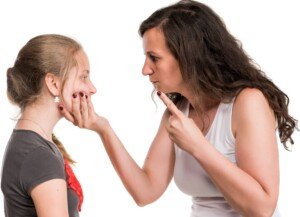
Find out what parents should never do in response to a child bullying a younger sibling; the way the parents respond in an attempt to “fix” the problem can make the situation far worse.
This article actually also applies to dads, but it’s usually the moms who catch a child in the act of bullying a younger sibling.
Has a child of yours been picking on, harassing or bullying a younger sibling for what seems like months on end, maybe even years?
This is a tip-off that whatever tactics you’re employing, in an attempt to end this problem, aren’t working.
Oddly, most mothers and fathers will continue using the same approach, even though it fails miserably; instead of detouring and trying a new tactic, they stick with the old, useless one — perhaps because straying from it would mean straying from a comfort zone.
But you know that famous saying: Insanity is doing the same thing over and over yet expecting a different outcome.
Don’t be insane!
What should mothers NEVER do in response to a child bullying a younger sibling?

Shutterstock/Volodymyr Baleha
First, never put your best interests ahead of the bully’s and the victim’s. Next, never base your response or reaction on how easy it is for you to do.
In other words, it’s rather easy for a mother to blow up at the instigator and unleash a diatribe of criticism to that older child, slinging hurtful comments and all.
Yes, it’s actually quite easy to react this way because it requires no planning, creative problem solving, patience, rationale or logic. It’s pure raw, primal emotion.
And it will backfire, because when a parent reacts this way to the bully of the younger sibling … she (or dad) is exhibiting the very behavior that they’re denouncing!
A reaction of disgust and anger does NOT teach or show the bully how to love and respect the younger sibling.
Chastising with, “You’re older! You should know better!” will not cultivate love for the younger sister or brother.
Instead, it shows the instigator your anger. Well gee…if the older child feels compelled to belittle and invalidate the younger…how is a display of your anger going to stop that?
A threat of punishment won’t work. Again, this tactic won’t address the root cause. It won’t magically make the instigator feel kindness towards the victim.
Ask yourself how on earth your fury and threats will make the bully feel warm and fuzzy towards the victim.
Secondly, the threat of punishment will only make the bully try harder not to get caught the next time, or to develop an ingenious way of getting away with the “crime.”
This reminds me of the 11-year-old boy who drank a glass of chocolate milk after being told by his mother not to (the mother didn’t like her kids filling up on sugary items).
The 11-year-old knew he’d get in big trouble for this. The knowledge of his mother’s anger, however, did not stop him from disobeying a rule.
How many times have you heard kids say things like, “If my mom found out I (fill in the blank), she’d kill me.” Or, “If my dad finds out I (fill in the blank), I’ll be ground meat.”
The threat of punishment will only produce a more clever child — as was the case of the 11-year-old boy.
Someway, somehow, this nasty adolescent manipulated his nine-year-old brother (whom he regularly bullied psychologically) into admitting that HE had drank the chocolate milk (the mother discovered the chocolate-smeared glass in the kitchen).
The younger sibling ended up taking a lot of heat from the mother.
So you see, threat of punishment or knowledge of what the parent will do, will not stop sibling bullying. It will only make the perpetrator more cunning.
Other Responses to Sibling Bullying that will Fail
Don’t go into rants about how the siblings are “blood sisters” or “he shares your flesh and blood,” etc.
One woman would go into the same furious spiel every time she caught her two young sons “going at it.”
She’d fume: “You two both come from the same womb! You make me so ashamed!”
One day I said to her, “Do you really think they care they came from the same womb? Can they even remember being in there?”
Her only defense was pointing out that (at the time) I didn’t have any kids, so what did I know?
Yet if she had all the answers because she was the parent, why then, after years of this same angry spiel, were her boys still continuing to fight?!
Her words struck like a fist and did nothing to make these boys love each other. As adults, they are estranged from each other.
Another Thought on Sibling Bullying
“When the parents get in the middle trying to determine who are the real bully and the real victim, the kids start fighting over the parents,” says Israel (Izzy) Kalman, MS, a nationally certified school psychologist; director of Bullies to Buddies: and author of numerous books and publications about bullying and relationship problems.
“They each try to convince the parent to take their side against the other.
“This process intensifies hostilities between the kids, and whoever lost the parents’ judgment is mad not only at their sibling but at their parent as well.
“They continue to create fights over nonsense in order to get the parents to take their side, and the parents unwittingly establish a never-ending state of war.
“Ironically, kids learn to get along best when we refuse to get involved in their fights. Humans are social creatures and are hardwired to learn to get along.”
Sometimes it’s helpful for parents to get involved in a sibling bullying scene, continues Kalman.
“But our role should be to teach them how to solve their problems with each other, not to try to solve the problems for them.
“There is a free manual on my website that explains in great detail how parents (and teachers as well) unwittingly cause their kids’ fighting to escalate, and how to dramatically reduce the fighting with little effort: A Revolutionary Guide to Reducing Aggression Between Children.”
 Dr. Kalman is a psychotherapist in private practice and has treated many victims of bullying for over 20 years. He has published extensively on solutions to bullying.
Dr. Kalman is a psychotherapist in private practice and has treated many victims of bullying for over 20 years. He has published extensively on solutions to bullying.
 Lorra Garrick has been covering medical, fitness and cybersecurity topics for many years, having written thousands of articles for print magazines and websites, including as a ghostwriter. She’s also a former ACE-certified personal trainer.
Lorra Garrick has been covering medical, fitness and cybersecurity topics for many years, having written thousands of articles for print magazines and websites, including as a ghostwriter. She’s also a former ACE-certified personal trainer.
.


































